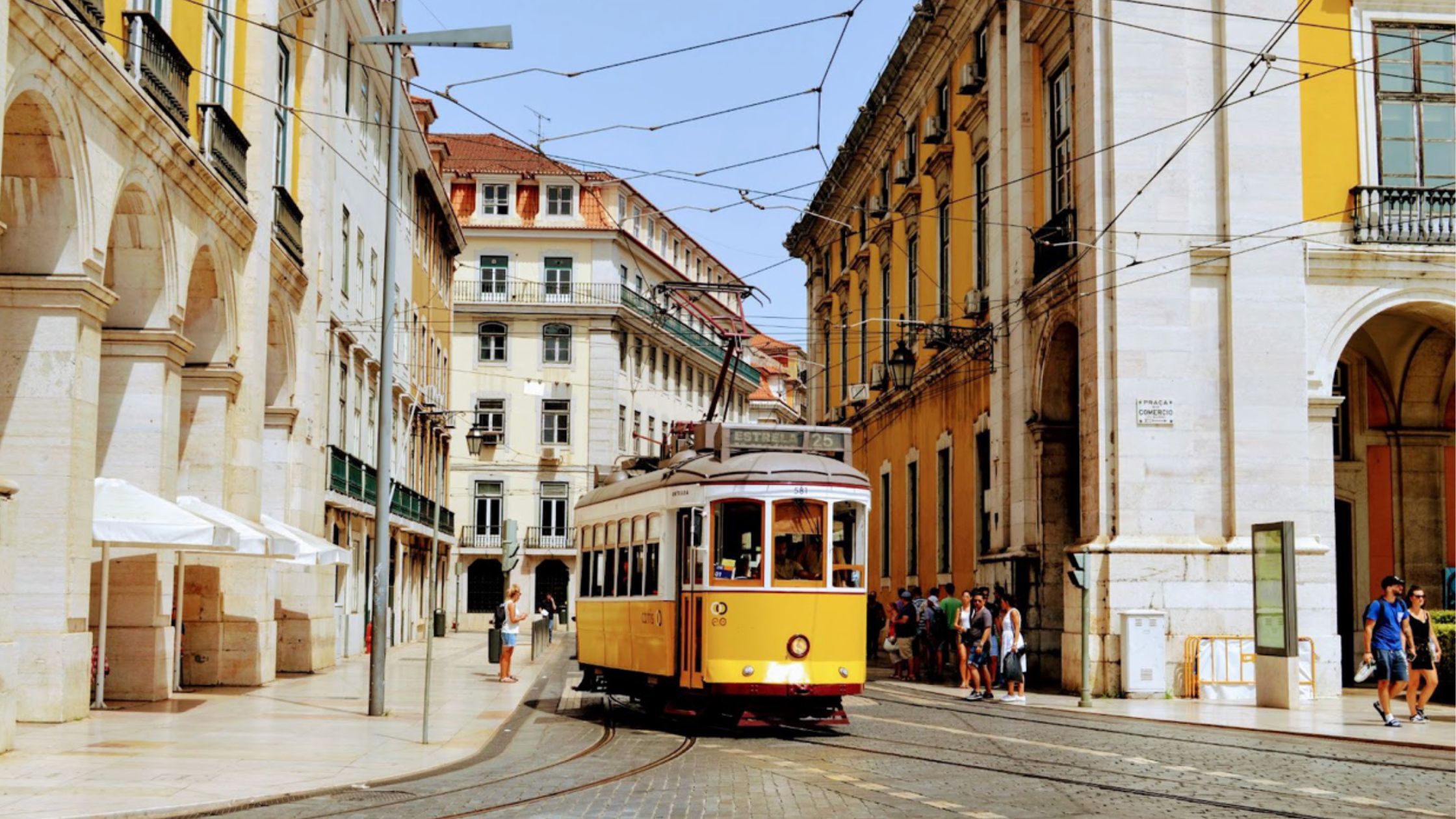Ever since the post-pandemic explosion in remote work, more and more countries have been establishing digital nomad visas in hopes of bolstering their economies. But while many of those countries are still hammering out the details, Portugal’s Digital Nomad Visa (D8 Visa) is fully operational—and quickly becoming one of the most sought-after options among European countries.
With year-round sunshine, a relatively low cost of living, and a thriving expat community, Portugal has long been a favorite among remote workers and freelancers. The country also boasts a growing network of co-working spaces, particularly in Lisbon, Porto, and Madeira, making it easy for digital nomads to stay productive while enjoying the country’s relaxed lifestyle.
Now, with a type of visa designed specifically for digital nomads, it’s easier than ever to live and work legally in Portugal—whether for a short stay or as a pathway to residency.
Here’s what you need to know about who’s eligible, how to apply, your tax obligations, and why Portugal stands out among other European destinations.
📋 Key Updates for 2025
- Two visa options: Temporary stay (up to 1 year) and residence visa (renewable up to 5 years, leading to permanent residency).
- Income requirement: Must earn at least 4x the minimum wage (€3,480/month in 2025, up from €3,280 in 2024).
- New for 2025: Applicants must now obtain a Número de Identificação de Segurança Social (NISS) (Social Security ID) as part of the application process.
Is it easy to get a Digital Nomad Visa in Portugal?
Compared to other European Union digital nomad visas, Portugal’s Digital Nomad Visa (D8 Visa) is one of the easiest to secure—but that doesn’t mean it’s a walk in the park. While Portugal welcomes remote workers with open arms (and pastel de nata), applicants still need to meet strict visa requirements to get approved.
How long does it take to get approved?
Processing times vary depending on where you apply, but expect 8 to 12 weeks for approval. Some lucky applicants get through faster, while others might face delays if consulates are overwhelmed or if paperwork isn’t in perfect order.
While official approval rates aren’t published, most well-prepared applicants have a high chance of success. If you meet the income threshold, have all the right documents, and can clearly prove you’re a remote worker, you’re already ahead of the game.
Pro Tip:
Portugal’s Digital Nomad Visa is in high demand, leading to a significant backlog of applications. If you're planning to move, apply as early as possible and ensure your paperwork is flawless to avoid delays. Keep an eye on processing times at your local consulate, as they can vary widely.
What can get your application rejected?
Even though Portugal makes it easier than many other EU countries, plenty of applications still get denied. Here’s what not to do:
- Your income proof is shaky: You need to show at least €3,480 per month in 2025 (four times Portugal’s minimum wage). If your bank statements or contracts are vague, outdated, or incomplete, expect trouble.
- Your paperwork is missing key pieces: A valid passport? Check. Health insurance? Check. Proof of income? Check. Criminal record check? Also check. One missing document can slow things down or even get you denied outright.
- You can’t prove you’re a remote worker: This type of visa is strictly for people who work remotely for companies outside Portugal, are self-employed, or run their own businesses. If your income depends on local clients or Portuguese employers, you’ll need a different visa.
- Your accommodation proof is weak: Portugal wants to know you have a place to stay. Whether it’s a long-term lease, property deed, or even a rental agreement, having clear proof of residence is a must.
If you have a steady remote income, a rock-solid application, and a little patience, getting a Portugal Digital Nomad Visa is very doable. Do your homework, triple-check your paperwork, and you could be sipping Vinho Verde in Lisbon before you know it.
What are the requirements for a Portugal Digital Nomad Visa?
Getting a Portugal Digital Nomad Visa isn’t complicated, but the country does have strict eligibility criteria to ensure applicants are financially stable and truly working remotely. Unlike EEA citizens, who can live and work in Portugal without a visa, U.S. and other non-EU expats must apply for a Portugal Digital Nomad Visa or another long-term visa to stay legally.
Here’s what you need to qualify:
1. Minimum income threshold
Portugal wants to ensure that digital nomads can comfortably support themselves while living in the country. To qualify, you must prove that you earn at least four times the Portuguese minimum wage:
- €3,480 per month in 2025 (up from €3,280 in 2024).
- Income can come from remote employment, freelancing, or business ownership, but it must be consistent and verifiable.
Acceptable proof includes:
- Bank statements showing income deposits.
- Client invoices or signed contracts.
- Employment letters confirming your remote work.
- Tax returns (if self-employed or running a business).
Pro Tip:
If your income fluctuates (as is common for freelancers), it's a good idea to show higher earnings over several months to prove financial stability.
2. Proof of remote work or self-employment
This visa is designed only for people who work remotely. If you’re planning to find a job in Portugal, this isn’t the right visa—you’ll need a different work or residence permit.
To prove you’re a legitimate remote worker, you must provide:
For employees:
- A letter from your employer stating that you work remotely and are not required to be in an office.
- Employment contract outlining your remote status.
For freelancers and self-employed individuals:
- Copies of recent client contracts showing ongoing work.
- Proof of business ownership (registration documents or tax filings).
- Recent invoices or bank transactions from clients.
Pro Tip:
If you work across multiple projects, having a mix of contracts and bank statements makes your case stronger.
3. Health insurance
Portugal requires all digital nomads to have private health insurance that covers them for the entire duration of their stay. This ensures that you won’t be a burden on the country’s healthcare system.
- The policy must explicitly cover Portugal (and preferably the EU).
- It should include emergency medical care, hospital treatment, and repatriation if needed.
- Short-term travel insurance won’t be enough—it must be comprehensive health insurance.
Once you’re a legal resident, you may be able to register for Portugal’s public healthcare system (SNS), but private insurance is required for the visa.
4. Proof of accommodation
Portugal wants to ensure you have a stable place to live once you arrive. This means you’ll need to provide proof of accommodation, which can include:
- A rental lease agreement (long-term rentals preferred).
- A property deed if you own a home in Portugal.
- A letter from a host (friend or family) confirming that you’ll be staying with them.
Pro Tip:
Short-term Airbnb bookings are not always accepted for the long-stay residence visa. If you’re applying for residency, it’s best to have at least a six-month lease in place.
5. Criminal record check
All applicants must submit a criminal background check to show they have no serious criminal offences. This must come from:
- Your home country (or any country you’ve lived in for the last five years).
- Some consulates may also require a Portuguese criminal record check, which can be obtained once you arrive.
If you have minor offences, it’s worth consulting with an immigration lawyer to determine whether it could affect your application.
Do digital nomads pay tax in Portugal?
Whether you owe taxes in Portugal as a digital nomad depends on how long you stay, which visa you hold, and whether you qualify for Portugal’s new tax incentives.
Portugal offers two main visa options for remote workers:
- D8 Digital Nomad Visa – Designed for remote workers and freelancers who want to live in Portugal while working for foreign companies.
- D7 Passive Income Visa – Intended for retirees or individuals with passive income from pensions, rentals, or investments.
Both visas allow expats to live legally in Portugal, but tax obligations depend on whether you become a Portuguese tax resident.
Staying less than 183 days: No tax residency
If you spend less than 183 days per year in Portugal, you are not considered a tax resident. That means:
- No Portuguese income tax on remote earnings, as long as your income comes from outside Portugal.
- You will continue paying taxes in your home country or country of tax residence.
- However, if you earn income from a Portuguese source (such as a local client or employer), you will be taxed in Portugal.
For short-term digital nomads using the D8 Temporary Stay Visa, this means you can live in Portugal without worrying about becoming a tax resident—as long as you leave before reaching the 183-day threshold.
Staying more than 183 days: Tax residency applies
If you spend 183 days or more within a 12-month period, you become a Portuguese tax resident, which means:
- Your worldwide income is subject to Portuguese taxes.
- You must register with Portugal’s tax authorities and obtain a Número de Identificação Fiscal (NIF)(Portuguese tax identification number).
- You may qualify for Portugal’s new Incentivised Tax Status (ITS) program, which replaces the Non-Habitual Resident (NHR) regime.
Pro Tip:
For digital nomads planning to stay in Portugal beyond a year, the long-term visa option under the Portugal Digital Nomad Visa allows for residency renewals and a pathway to permanent residence or Portuguese citizenship.
What happened to the Non-Habitual Resident (NHR) program?
Portugal’s NHR program, which previously offered tax benefits to expats for up to 10 years, ended in January 2024.
- Individuals who registered as tax residents in 2023 (and had not been taxed in Portugal in the previous five years) could still apply until March 31, 2024.
- Some individuals meeting specific criteria (such as having a lease, employment contract, or school enrolment in Portugal by late 2023) can apply until March 31, 2025.
- Those approved under NHR will retain their benefits until December 31, 2033, but new applicants are no longer eligible.
Since the NHR program is now closed, digital nomads staying long-term must look at Portugal’s new tax incentive program instead.
What replaces NHR? The Incentivised Tax Status (ITS) program
The Incentivised Tax Status (ITS) program, officially called the Tax Incentive for Scientific Research and Innovation, replaces NHR and offers reduced tax rates for certain professionals.
If you qualify, you’ll pay a flat 20% tax rate on eligible professional income from Portuguese sources. Additionally, most foreign-sourced income—such as dividends, interest, capital gains, and rental income—will be exempt from Portuguese taxation.
But unlike the old NHR scheme, pension income is no longer tax-exempt under the new rules.
To qualify for the ITS program, you must:
- Become a tax resident in Portugal.
- Have not been a tax resident in Portugal in the past five years.
- Earn income in a government-approved professional category.
The program targets individuals working in industries that Portugal wants to attract, such as research, technology, renewable energy, tourism, and media. Highly skilled professionals, entrepreneurs, and those working for startups or companies recognized as contributing to the national economy may also qualify.
These tax benefits last for 10 years, making ITS an attractive option for those planning a long-term move. However, unlike NHR, this program is not open to everyone—your eligibility depends on your profession and employer.
Pro Tip:
The Portugal Golden Visa is a popular residency-by-investment program, but unlike Portugal Digital Nomad Visa holders, applicants will require significant investments in real estate or other qualifying assets.
Worried about being taxed twice?
Since the U.S. taxes citizens on worldwide income, moving to Portugal doesn’t exempt you from filing U.S. taxes. Most expats use:
- Foreign Earned Income Exclusion (FEIE): Allows you to exclude up to $126,500 (2024 limit) of foreign-earned income from U.S. taxation.
- Foreign Tax Credit (FTC): Offsets U.S. taxes with taxes paid in Portugal, useful for those earning above the FEIE limit.
Social security is also a factor. If you work remotely for a U.S. employer, you’ll likely continue paying U.S. Social Security taxes. If you’re self-employed or working in Portugal, you may need to contribute to Portugal’s system instead under the Totalization Agreement.
To ensure you maximize tax benefits and stay compliant with U.S. reporting requirements (FBAR, FATCA), working with an expat tax specialist is highly recommended. Handled correctly, you won’t be taxed twice.
Do digital nomads pay taxes in Portugal? (2025 update)
| Staying less than 183 days on a D8 Temporary Stay Visa | No, unless earning income from Portugal |
| Staying 183+ days on a D8 Residence Visa or D7 Visa | Yes, tax residency applies |
| Eligible for ITS program | Flat 20% tax on eligible Portugal-sourced income exemptions on most foreign income |
| Covered by a DTA | May avoid double taxation |
How to apply for a Portugal Digital Nomad visa
Applying for a Portuguese Digital Nomad Visa is a straightforward but document-heavy process. Whether you’re applying for a temporary stay visa (up to one year) or a residence visa (renewable for up to five years), the steps are largely the same. Here’s how to navigate the process.
Step 1: Gather necessary documents
Before submitting your application form, make sure you have all the required paperwork:
- Valid passport: Must be valid for at least six months beyond your intended stay.
- Proof of remote work: Documentation such as an employment contract, client agreements, or business registration proving that you work remotely.
- Proof of monthly income: You must show earnings of at least €3,480 per month in 2025 (four times Portugal’s minimum wage). Acceptable documents include bank statements from an American or Portuguese bank account, invoices, and employment contracts.
- Clean criminal record: Background checks from your home country or any country where you’ve lived in the last five years. (You may need to fill out this background check consent form.)
- Health insurance: A private health insurance policy that covers you in Portugal for the duration of your stay.
- Proof of accommodation: A rental lease, property deed, or a letter from a host confirming your place of residence in Portugal.
- Application fee: Costs vary by consulate but typically range from €75 to €180.
- For family members: If applying with dependents, include marriage or birth certificates along with proof of financial support to show you can sustain them in Portugal.
Step 2: Submit your application
Once your documents are ready, you must apply at a Portuguese consulate or embassy in your country of residence. Some consulates allow online applications, while others require an in-person appointment. (Here’s a handy Portuguese embassy locator.)
- Fill out the official National Visa Application form and submit it along with all required documents.
- Pay the application fee (varies by location).
- If required, schedule an interview.
Pro Tip:
Most application forms for the Portugal Digital Nomad Visa are available in English, but some official documents may need to be submitted in Portuguese, so professional translation might be required.
Step 3: Attend your visa interview (if required)
Some applicants may be called for an interview at the consulate. This is a routine step where you’ll be asked about:
- Your remote work situation and monthly income.
- Your plans in Portugal, including where you’ll live.
- If applicable, details about family members joining you.
The key is to demonstrate that you meet the income and accommodation requirements and that you’ll be working remotely without seeking local employment.
Step 4: Wait for approval and collect your visa
Processing times vary by country but generally take 8–12 weeks. Once approved, you’ll receive a visa stamp in your passport, allowing you to enter Portugal.
- If you applied for a temporary stay visa, you can now live in Portugal for up to one year without residency.
- If you applied for a residence visa, your visa will be valid for four months, during which you must apply for a residence permit upon arrival.
Step 5: Apply for a residence permit
If you’re planning a long-term stay, your final step is to apply for a residence permit through AIMA (Agência para a Imigração e Mobilidade Administrativa), Portugal’s new border service that replaced SEF, within four months of arrival.
- Book an appointment online at AIMA’s website.
- Bring your passport, visa, proof of accommodation, proof of monthly income, and health insurance.
- Pay the residence permit fee (around €160).
Once approved, you’ll receive a residence card, which allows you to live and work remotely in Portugal and travel visa-free within the Schengen area.
Planning your move? Make sure your taxes are in order
Portugal’s Digital Nomad Visa is one of the best options in Europe, offering a clear path to residency, tax advantages, and a welcoming expat community. With application backlogs growing, it’s a good idea to start the process early and ensure you meet all requirements.
If you’re a U.S. expat settling in Portugal, it’s also important to understand how your move affects your tax obligations in both countries. Bright!Tax can help you navigate U.S. and Portuguese tax requirements, ensuring you stay compliant and avoid unnecessary penalties. Just note your Portugal residency when getting started, and we’ll handle the rest. Get in touch with us here.
Frequently Asked Questions
-
Who can apply for Portugal’s Digital Nomad Visa?
U.S. citizens aged 18+ who work remotely for a non-Portuguese employer, run their own business, or freelance for international clients can apply—so long as they meet the income threshold and provide the required documentation.
-
How much income do I need to qualify in 2025?
You must earn at least €3,480 per month (4x Portugal’s minimum wage). Proof can include bank statements, contracts, or tax returns.
-
Will I pay Portuguese taxes as a digital nomad?
Only if you stay 183 days or more in a 12-month period. In that case, you become a tax resident and may qualify for Portugal’s new Incentivised Tax Status (ITS) program, which offers a flat 20% tax rate on eligible local income and exemptions on most foreign income.
-
How long does it take to get the visa?
Processing typically takes 8–12 weeks. Applying early and submitting complete, well-prepared documents can speed up approval.
-
What documents do I need to apply?
Key documents include:
-
Proof of remote work & income
-
Health insurance that covers Portugal
-
Background check
-
Proof of accommodation
-
Valid passport and application fee
-

 Connect on LinkedIn
Connect on LinkedIn

